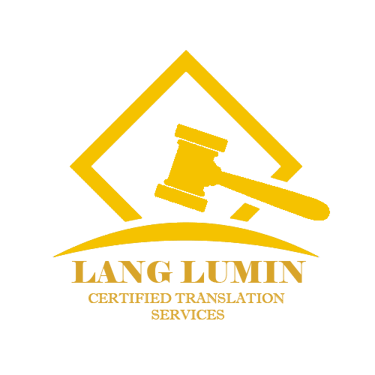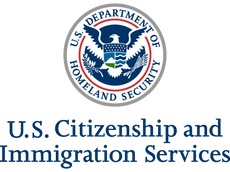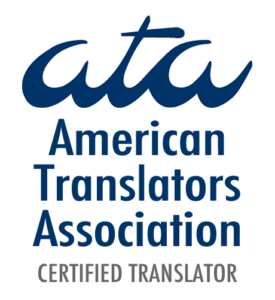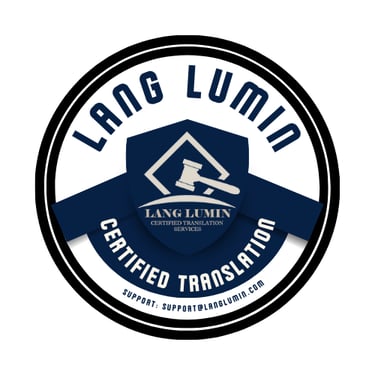Certified Translation Services in Canada
When applying for immigration, academic programs, or legal processes in Canada, you’ll often need certified translations of your documents. These translations must meet strict requirements set by Canadian authorities, including Immigration, Refugees and Citizenship Canada (IRCC), Global Affairs Canada, and educational institutions.
In this comprehensive guide, we’ll cover:
What certified translations are and why they’re required
Which documents need certification
How to get fast, reliable translations
Why Lang Lumin is the best choice for Canadian-certified translations
What Is a Certified Translation in Canada?
A certified translation is an accurate and legally recognized translation accompanied by a signed statement from a certified translator confirming its authenticity. Unlike standard translations, certified translations are:
✅ Accepted by Canadian government agencies (IRCC, provincial authorities)
✅ Required for academic applications (universities, colleges)
✅ Necessary for legal and business documents
Who Can Certify Translations in Canada?
Only translators certified by recognized Canadian associations can provide valid translations, including:
ATIO (Association of Translators and Interpreters of Ontario)
ATIA (Association of Translators and Interpreters of Alberta)
ATIS (Society of Translators and Interpreters of Saskatchewan)
OTTIAQ (Ordre des traducteurs, terminologues et interprètes agréés du Québec)
If a document is used outside Canada, it may also require notarization or an apostille.
When Do You Need a Certified Translation in Canada?
1. Immigration & Visa Applications
IRCC requires certified translations for:
Birth certificates
Marriage/divorce certificates
Police clearance certificates
Passport copies
Bank statements
2. Academic Applications
Canadian universities and colleges require certified translations of:
Diplomas and transcripts
Recommendation letters
Professional certifications
3. Legal & Business Documents
Court judgments
Contracts
Corporate registration documents
4. Personal & Administrative Use
Driver’s licenses
Medical records
Property deeds
Without a certified translation, your application may be rejected or delayed.
How to Get a Certified Translation in Canada
Step 1: Choose a Certified Translator
Ensure your translator is accredited by ATIO, OTTIAQ, or other recognized
Canadian associations.
Step 2: Submit Your Documents Securely
Reputable services offer online uploads for convenience.
Step 3: Receive a Certified Translation with a Statement of Accuracy
The translator will:
Provide a signed declaration
Include their certification details
Format the document correctly
Step 4: Fast Processing & Delivery
Depending on urgency, translations can be completed in as little as 12 hours.
Why Choose Lang Lumin for Canadian Certified Translations?
At Lang Lumin, we specialize in IRCC-accepted translations with:
✅ Certified Canadian Translators – Accredited by ATIO, OTTIAQ, and other official bodies
✅ Fast Turnaround – From 12 hours for urgent requests
✅ Notarization & Apostille Services – For international use
✅ Secure Online Ordering – Upload documents and receive certified PDFs or mailed copies
✅ 24/7 Customer Support – Assistance via phone, email, and WhatsApp
Whether you’re applying for permanent residency, a student visa, or legal documentation, Lang Lumin ensures 100% acceptance by Canadian authorities.
Frequently Asked Questions (FAQs)
1. What’s the difference between a certified and a notarized translation?
A certified translation is done by an accredited translator and includes a signed statement.
A notarized translation involves a notary public verifying the translator’s identity (often needed for international use).
2. How long does a certified translation take?
Most providers offer 12-hour to 3-day turnaround. Lang Lumin provides express options for urgent needs.
3. Are digital certified translations accepted by IRCC?
Yes, as long as they include the translator’s certification statement. Some cases may require a hard copy.
4. Can any bilingual person certify a translation for Canada?
No! Only certified translators (ATIO, OTTIAQ, etc.) are accepted by IRCC and Canadian institutions.
5. Do I need a certified translation for a Canadian student visa?
Yes, universities and IRCC require certified translations of academic records.
6. Does Lang Lumin provide notarization and apostille services?
Yes, we offer notarized translations and apostille certification for documents used abroad.
7. What if my translation is rejected by IRCC?
Lang Lumin provides a 100% acceptance guarantee—we’ll correct any issues at no extra cost.
8. Can you translate business contracts for use in Canada?
Absolutely! We provide legally valid translations for contracts, agreements, and corporate filings.
Final Thoughts
Certified translations are mandatory for Canadian immigration, education, and legal processes. Choosing a trusted provider like Lang Lumin ensures:
✔ Fast, accurate translations
✔ Full compliance with IRCC requirements
✔ 24/7 support for urgent needs
Need a certified translation for Canada? Contact Lang Lumin today for guaranteed acceptance!












